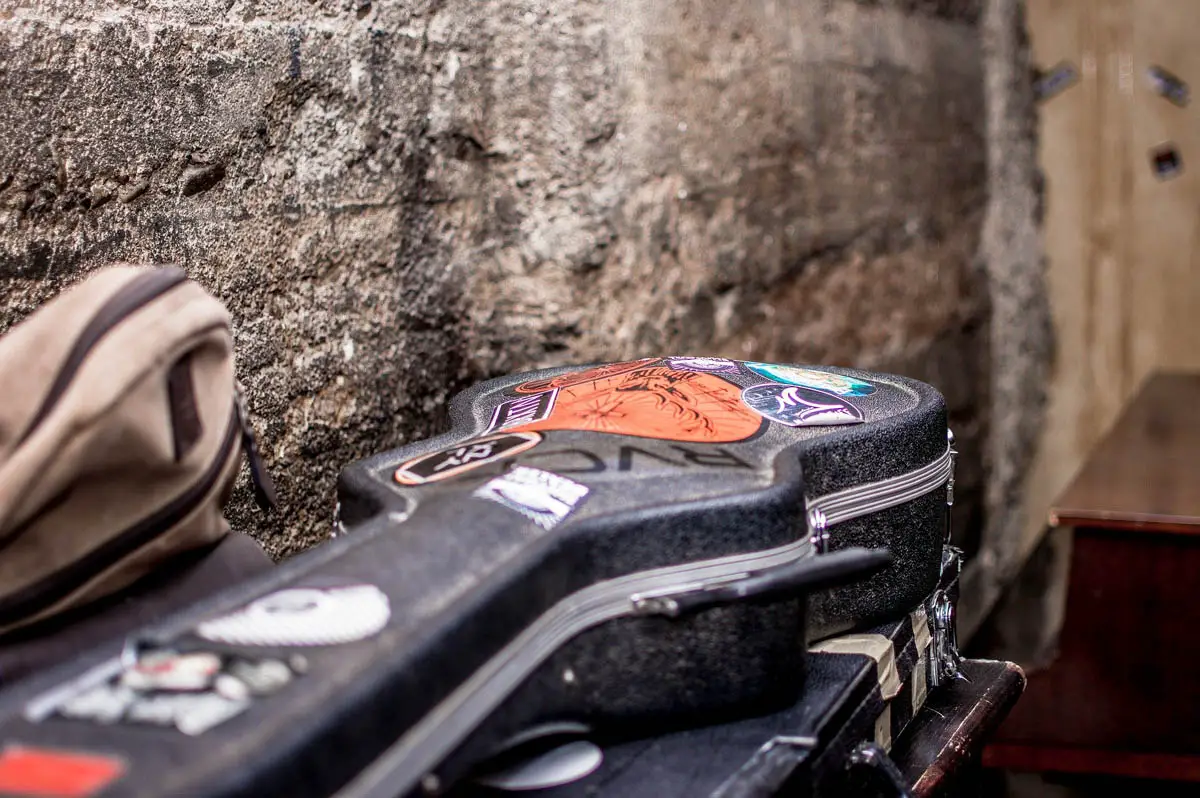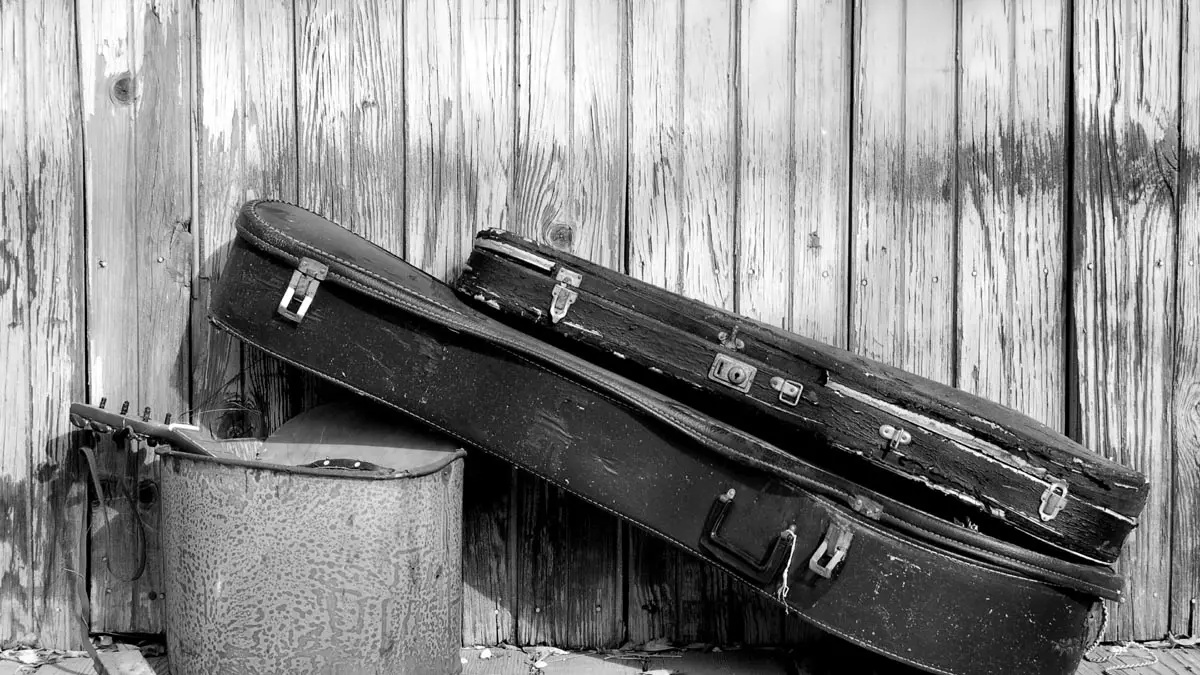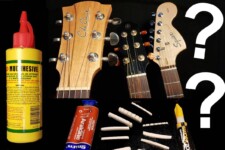How to Store A Guitar the Safest Way (Save Your Axe!)
Storing your guitar correctly will help it last longer preventing unwanted damage, and will keep it sounding better with less string changes.
If you live in a hot, cold, dry, or humid place it is even more important to know how to store your guitar correctly, as all these environments can be harmful to an exposed guitar.
Even storing your guitar longer term or while you are traveling can cause damage, and fixing the damage may be expensive, or make your guitar unplayable.
How Should You Safely Store A Guitar?
A hard case is the best protection to store a guitar safely. Avoid keeping them near heat sources, extreme cold, and humidity outside the 30-70% range. Store them upright and centrally in your home. For long term storage slightly release the string and truss rod tension.

There are reasons why this is the best storage method, and even if you store your guitar correctly you need to think about the best place in your house to store them.
Let’s take a closer look at what can go wrong and discuss the best ways of storing acoustic and electric guitars.
Our website is reader-supported. If you buy via links on our site we may earn a small commission.
Keep It Safe In a Guitar Case
Obviously, the best way to protect your guitar is keeping it inside a hard case.
Guitars left out sitting on floor stands are more susceptible to being damaged by taking knocks, being tipped over, or from environmental damage.
If you store your guitar in a soft gig bag, it will certainly keep dust off your guitar, but they can still be easily damaged through drops or knocks – especially if you travel with it.
Hard cases, particularly ABS plastic ones, give your guitar maximum protection and are reasonably effective at slowing down abrupt changes in temperature and humidity.
How Long Can You Store a Guitar on a Stand?
There is no defined limit for how long you can store a guitar on a rack, stand, or wall mount, however you should pick the guitar up regularly to avoid sticking. Keep the stand away from sunlight, heat sources, and high humidity. Ensure you clean your guitar regularly with a soft cloth.
Floor stands and racks are a great option for guitars that are regularly played, but there’s a few extra things to consider vs having them in a hard case.
Tripod-style stands for storing single guitars are usually quite sturdy and are great for smaller spaces in your home, or for a single guitar that you play frequently.
Racks are even more stable than tripods, and if you have a few guitars you play regularly (lucky you!) they are a great option for keeping guitars out and saving space.
One thing to keep in mind with a rack is that the guitars are stored close together, and it’s easy to knock them against each other if you’re not careful.
If you want to keep your guitars in good condition don’t keep the stand near a window, door, air-conditioning unit, or a heater.
Protecting Guitars With A Sheet
Another way to protect your guitars on a rack is to put an old sheet over the top to help keep reduce exposure to sunlight, humidity, and dust.
If you don’t have space for a floor stand, then a wall-mount might be more suitable for you, and makes a guitar less prone to damage than sitting on the floor.
The thing to remember with all racks is that a guitar left sitting on a rack or hanging on a mount can eventually damage the finish on the guitar if they are not moved for a long time.
Some finishes are more susceptible than others, but any rubber or foam surface left for long periods of contact will eventually stick to the guitar and will cause damage when you ‘un-stick’ them.
Should You Store a Guitar Upright or Flat?
Storing guitars longer term you are really best to store them in a hard case for maximum protection, and they can be stored like this for many years if you take a few precautions.
Storing an uncased guitar lying on its back is asking for trouble, and some people recommend not storing guitars in their cases this way either.
Can You Store a Guitar Lying Down?
Storing guitars upright vs flat theoretically makes no difference to the guitar itself – providing the case fits and supports the guitar inside properly.
If a case is lying flat and the body of the guitar inside has space under it, this will place upward pressure on the neck that can cause warping over time.
This could leave you with an unplayable guitar with a high action that can’t be adjusted with the truss rod.
Laying cases flat and stacking other cases or heavy objects on top could cause the cases to bow inward and damage the guitar over time.
This could even be more of an issue if your guitar case is made from compressed cardboard or chipboard, as those materials tend to sag normally under the effects of gravity.
Another thing that can happen with a case laying flat is that moisture can build up under it causing mildew, and this is particularly so with cases on the floor.
Space Saver
Another good argument for storing cases upright is that they don’t take up as much space, and they can easily be stacked in a cupboard which gives added environmental protection.
Cases can be stacked together standing up like dominoes without undue pressure on adjoining cases, and a benefit is you can easily grab a case out of the stack.
Air flow is usually better around standing cases, and this can help prevent moisture and mold.
Where Should You Store Guitars in Their Cases?
Even though guitars are generally well protected in hard cases, there are still places in your house that are not good for storing them.
Anywhere that is damp or has regular swings in temperature will adversely affect your guitar and should be avoided.

Can You Store Guitars in the Basement?
Basements can present a couple of problems for guitar storage, even in a hard case.
Most basements harbor a certain amount of dampness, and even with vents open to circulate the air a basement can be too humid for storing guitars.
Since wood absorbs moisture from the air around it your guitar can eventually get mildew growing in the pores, and it may not be salvageable.
Some basements also have unsealed concrete floors, and storing a guitar case (particularly if stored flat) will cause dampness in the guitar case.
If your only choice is a basement, seriously consider waterproofing and sealing the area, and invest in a dehumidifier that will maintain a constant 45% – 55% humidity level.
Also ensure you check your guitars monthly for any signs of dampness. Strings going rusty can be a warning sign.
Should You Store a Guitar in the Attic?
Your attic is another place not great for guitars, as they can be prone to high daytime temperatures.
Hide glue melts at 145° F and Titebond melts at 135° F, so if you leave a guitar cooking in the sun in your attic (or in front of any sunny window for that matter) the glue will soften.
When glue softens on a guitar you can have huge problems like a glued neck coming apart, or the bridge lifting off on an acoustic guitar.
A fact that most people don’t know is that humid air is less dense than dry air, and so humid air will rise through your house and can ultimately end up in your attic – particularly during winter months.
So an attic may be worse than a basement due to extreme changes in temperature with the added possibility of high humidity.
Don’t Leave Your Guitar in a Hot Car
For the same reason that you shouldn’t store a guitar in the attic, it’s a bad idea to leave your guitar in a hot car.
A hot car can get up to very high temperatures, and the temperature can climb rapidly as much as 20 degrees in only 10 minutes.
For instance, on a 90 degree day the temperature in a car left in the sun can reach about 130 degrees in one hour.
A hard case may protect it from bumps and drops but can act like an oven if left in a car, especially if it is in direct sunlight.
Should You Store a Guitar Under a Bed?
Ok, so keeping your guitar under your bed seems like a good idea – right?
As long as it’s nice and dry under your bed there shouldn’t be a problem, especially if you get it out to play every now and then.
Keeping some airflow around your guitar is important, so don’t cover it in old underpants and t-shirts!
As long as you don’t leave your guitar under there for months at a time without checking on it, everything should be fine.
How to Safely Store a Guitar Long Term
There are 4 main dangers to your guitar whether stored in a gig bag, hard case, or on a stand.
If you need to put away your guitar for many months at a time, then consider a soft gig bag as the minimum requirement to keep off dust and help protect metal components from rust.
Let’s now take a look at each danger so you can avoid damage when you choose a storage location.
Heat
Heat itself doesn’t have a large effect on wood, however your guitar has joints that are glued.
Glue hardens and shrinks when cold, softening and stretching when warm.
If you combine string tension with soft glue, you end up with ‘glue-creep’ and over time you could see problems like a neck joint starting to separate, or the bridge lifting on an acoustic guitar.
Strings expand and shrink with changing temperature, and in extreme cold like an unheated garage in the winter, will place extra stress on the guitar; particularly a nylon string guitar.
Although wood is quite hardy, the finish on the wood expands and shrinks with temperature changes and can crack into spiderweb hairline cracks known as ‘cold-checking’.
Modern day finishes are quite resistant to this problem, but older guitars or expensive guitars with thin nitro finishes are more prone to this issue.
So avoid storage places with large swings in temperature like attics, basements, garages, windows facing the sun, and cars.
Humidity
Most guitars are fine within a range of about 30%-70% humidity.
Wood is hygroscopic, so it absorbs moisture from the air around it and can also lose moisture to become dry – expanding and shrinking with each action.
When wet wood swells it can cause problems with the back of a guitar where the bracing is glued, and can have a noticeable effect on the fretboard and neck relief.
In the worst cases you can end up with mildew rusty metal hardware and could even see the bracing come loose in an acoustic guitar.
Low humidity dries the wood causing it to shrink and can cause failure of glue joints and cracks in soundboards.
If you have air-conditioning or constant winter heating the air can become particularly dry, and you may need to provide moisture to raise the humidity.
A good idea is to get a digital hygrometer to monitor the humidity, and these are available in simple models for around $20, up to wireless models for up to $70.
Check out hygrometers at Amazon.
You can also get humidipacks which help control the humidity within a given range, and you can place these inside your guitar case.
Just be mindful with these that they may need replacing every couple of months, so can get expensive over time.

See humidipacks and prices at Amazon
Humidipacks work well but they have limited capability, so if the outside humidity is constantly too high or low you may need to invest in a room dehumidifier, or a cool mist room humidifier. You can see some options and prices by clicking the links.
Impact
It goes without saying that impacts to your guitar will cause damage, particularly with acoustic guitars.
A soft case will protect from scrapes, but any decent knocks or drops can chip surfaces or in the worst case, crack or break the instrument.
A hard case is the best option, particularly if your guitar has value to you – and sometimes that value goes far beyond the cost of the guitar.
Pressure/Tension
If the neck or body of your guitar have pressure applied over time this can warp the instrument.
Make sure you don’t sit heavy objects on top of guitar cases, as they can sag over time and end up placing pressure on the guitar inside.
As we’ve mentioned before, it’s usually best to store guitars upright to avoid undue neck tension if the case doesn’t perfectly support the guitar inside.
Should You Store Electric or Acoustic Guitars Without Strings?
If you’re planning to leave your guitar stored for more than a few months, then removing the strings for is a good idea…
BUT!
If you remove the strings, the truss rod will still be adjusted to pull the neck backward against the string tension.
If you remove the strings to relieve long term tension on the guitar, make sure you also loosen the truss rod to allow the neck to sit in its natural unstressed state.
If you plan to play your guitar at least once every 3 months there’s no need to de-tune your strings, especially when you store it with the above guidelines in mind.
If you have ever removed all the strings from your guitar then the nut may have fallen off. Check out: should the nut be glued on guitars?
Storing Guitars With a Capo
If you leave a capo on your guitar for long periods there is a good chance you will cause the rubber on the capo to damage the finish on your guitar, as the two surfaces will form a bond.
As well as this, the wood can become dented over time with the constant pressure of the capo.
Some people like to clamp the capo on the headstock, but I highly recommend not doing this. The extra weight added to the headstock can cause it to crack or break off at the glue joint if the guitar gets knocked over (even in the case).
For these reasons, it’s always best to store your capo separately to your guitar.
Conclusion
So, if you can avoid the main dangers to your guitar, there’s no reason why you can’t store your guitar safely for as long as you need.
Follow the guidelines above and you should be set to grab your guitar out of storage whenever you want , tune it up, and play that thing!
Sources
https://www.dummies.com/art-center/music/guitar/how-to-maintain-a-good-environment-for-a-guitar/




